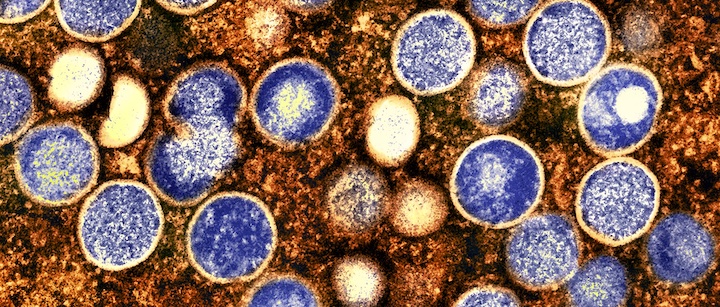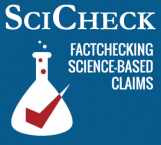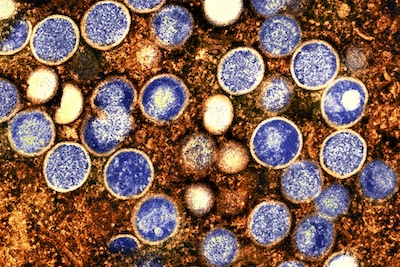
Este artículo estará disponible en español en El Tiempo Latino.
SciCheck Digest
Responding to rising mpox cases in Africa, the World Health Organization declared a public health emergency of international concern on Aug. 14. Social media posts subsequently repeated a plethora of false or baseless claims, including that COVID-19 vaccines cause the viral disease or that the current outbreak is part of a global conspiracy.
Full Story
Mpox is a viral disease caused by the monkeypox virus, found in small mammals in parts of Africa. The virus historically has caused limited outbreaks in humans after spreading to them from animals. It causes a painful rash and is sometimes lethal, although it causes less severe disease than the related smallpox virus.
As we’ve previously written, there are two main types, or clades, of the virus. A version of the virus belonging to clade II spread around the world in humans in an outbreak starting in 2022, primarily affecting men who have sex with men. The outbreak continues, albeit with lower levels of infection globally than at its peak.

Meanwhile, another family of mpox-causing viruses belonging to clade I has been on the rise in parts of Africa, and in 2023, a subset of these viruses started to show sustained spread among people in the Democratic Republic of Congo and some nearby countries. (For more, see SciCheck’s “Q&A on the Second International Mpox Emergency.”)
In recognition of the surge of mpox in Africa, the World Health Organization last month declared a public health emergency of international concern, which doctors and scientists hope will spur global collaboration to support affected countries in responding to the ongoing mpox epidemics.
An outpouring of false or baseless social media claims about mpox and the public health emergency predictably followed.
False Claims About Vaccines
Some posts referenced debunked claims from the 2022 mpox outbreak. For instance, several posts referred to false claims that various COVID-19 vaccines cause mpox. But there’s still no evidence that COVID-19 vaccines cause mpox, Dr. Krutika Kuppalli, an infectious disease physician who formerly worked on the WHO’s mpox team, told us.
“THE ASTRA ZENECA COVID JAB CONTAINED MPOX,” screenshotted text in one post incorrectly stated, accompanied by information about the vaccine with the words “chimpanzee adenovirus” circled. A similar screenshot was also shared elsewhere.
As other fact-checkers have previously written, the AstraZeneca vaccine — which was authorized in many countries, but not the U.S. — does not contain the virus that causes mpox.
The AstraZeneca COVID-19 vaccine does contain a chimpanzee adenovirus vector. But this virus is completely different from the virus that causes mpox, and the version used in the shots is unable to replicate in people. It simply contains the information needed to prompt the body to make a protective immune response against the coronavirus.
Posts also spread misinformation on the Pfizer/BioNTech COVID-19 vaccine, falsely insinuating that cases of mpox might not be real and are just a way of concealing a COVID-19 vaccine side effect.
“Auto immune blistering disease is a reaction to the Pfizer vaccine,” said a screenshot shared in one post. “Monkey pox is a cover up!” the text eventually concluded.
In a regulatory filing that has been widely misinterpreted, Pfizer included autoimmune blistering disease as one entry in a long list of “adverse events of special interest” that were being watched for. The list is not, as many have claimed, a list of side effects that have been shown to occur as a result of the vaccine.
Although there have been some rare reports of autoimmune blistering disease occurring after vaccination, research suggests those reports are coincidental, and the condition is not a COVID-19 vaccine side effect, undermining the entire premise of the post. Also, mpox and autoimmune blistering diseases are completely different types of diseases with different symptoms and methods of diagnosis, experts previously told Reuters, so it’s not plausible that mpox could be used as a “cover up” for autoimmune blistering disease.
Another post spread misinformation on ACAM2000, a smallpox vaccine recently approved by the U.S. Food and Drug Administration to prevent mpox. In the post, a video falsely stated that the vaccine’s insert says it “may in fact spread the smallpox virus to other people.”
The vaccine will not spread smallpox, and the insert says no such thing. Rather, ACAM2000 contains the vaccinia virus, which is related to both the monkeypox virus and the variola virus that causes smallpox. Vaccinia virus from the vaccine can infect people and in rare cases spread to others. For this reason, ACAM2000 should not be given to certain people, including those who are immunocompromised, and those who are vaccinated must be careful not to expose others to their vaccination site. But the vaccine doesn’t cause smallpox — it causes an infection that is much less severe. In most cases, healthy people experience only mild symptoms from the vaccine.
The ACAM2000 vaccine also can cause several serious side effects, which must be weighed against the benefits of vaccination. Fortunately, another mpox vaccine, Jynneos, is available and contains weakened vaccinia virus that cannot replicate. It therefore cannot spread vaccine virus to others, and its safety profile is better. It’s this vaccine that has been given in the U.S. during the ongoing mpox outbreak that started in 2022.
ACAM2000 “has not been used for U.S. civilians affected by the [mpox] global outbreak that began in 2022, and there are no plans to use it broadly during mpox outbreaks,” a spokesperson for the Centers for Disease Control and Prevention told us in an email.
A Resurgence of Conspiratorial Thinking
Other posts brought to mind conspiracy theories previously raised in response to other viral outbreaks, including the COVID-19 pandemic, the global mpox outbreak starting in 2022 and the current H5N1 bird flu outbreak in U.S. dairy cows. (The WHO declared and subsequently lifted international public health emergencies for COVID-19 and the 2022 mpox outbreak.)
To be clear, there’s no evidence any of those outbreaks were caused by humans with any kind of global agenda, just as there is no evidence of such a plot with these mpox outbreaks.
One recent post baselessly implied there was something nefarious or intentional about the timing of the mpox international public health emergency and related events. “Just in perfect time for the elections,” the post read.
 Monkeypox virus particles. Image by National Institute of Allergy and Infectious Diseases.
Monkeypox virus particles. Image by National Institute of Allergy and Infectious Diseases.But mpox is a disease researchers have been tracking for more than half a century. As we’ve written, possible contributors to the recent uptick in cases in Africa are complex. They include ecological changes and waning immunity to smallpox, which younger generations stopped being vaccinated against after the disease was eradicated. (Immunity to smallpox can protect people from getting mpox.)
The idea “that this is coming up because of the election” is “just not true,” Kuppalli said. “This is a disease that was first discovered in 1958, first human cases in 1970. … There’s been cases in DRC every year,” she said, referring to the Democratic Republic of Congo. “Now again, we don’t quite understand why we’re seeing an increased number in the last couple years, but unfortunately there’s lots of factors … and they have nothing to do with the U.S. election.”
Other posts also implied a vague, nefarious plan behind the current mpox outbreaks, referring to “fear campaigns” or a “planned strategy to unify everything under one centralized global gov.”
“Is Monkeypox Being Used to Justify New Restrictions?” a widely shared post asked. The post featured a clip of Bret Weinstein, a former biology professor with a history of sharing misinformation. Weinstein claimed that with mpox, “they are just simply doing a [rerun],” seemingly referring to the COVID-19 pandemic. (The word “rerun” was partially obscured in the recording and written as “RER*N.”) He also insinuated some sort of nefarious foreknowledge of the mpox outbreaks, saying, “they telegraphed that this was coming” while referring to pandemic preparedness activities of the WHO and his own prior efforts to protest these activities.
But as we have written previously, the WHO’s pandemic preparedness efforts do not mean that the organization can mandate public health measures, such as vaccinations, or override national sovereignty.
Nor did the WHO declare an mpox emergency to justify any restrictions. “The declaration of the upsurge in mpox cases as a public health emergency of international concern … was not made in order to justify new restrictions, control people or unify people under a global government,” a WHO spokesperson told us via email.
Rather, the emergency was declared in response to the increased mpox cases “and the potential to spread further across countries in Africa and possibly outside the continent,” the spokesperson said, concluding, “it was determined that a coordinated international response was needed to stop these outbreaks and save lives.”
Further, the spokesperson said, the WHO is “unaware of any lockdowns being instituted in response to the outbreaks of mpox cases, and WHO has not recommended lockdowns.”
However, some posts nonetheless referred to lockdowns and other restrictions. “Lockdowns and kissing each other with masks have started because of a monkeypox psyop,” read another post. Another mpox-related post said there was “talk about lockdowns” and referenced a “plan-demic,” referring to a baseless COVID-19 conspiracy theory that the coronavirus was released on purpose as part of some larger plan.
Jason Kindrachuk, who studies the circulation and transmission of emerging animal-derived viruses at the University of Manitoba, told us that the virus that causes mpox is fundamentally a different virus than the one that causes COVID-19. The COVID-19 pandemic was caused by a respiratory virus that spread rapidly around the globe, whereas mpox spreads via close physical contact.
“We’re not even within the realm of talking about lockdowns and all those things again that came with COVID,” he said. “But let’s not minimize what this is just because we think the risk to us in North America or to people in Europe is fairly low.”
According to Kindrachuk, the hope is that the international public health emergency will promote access to vaccines and other resources for those who currently don’t have the option of getting them at all. While mpox vaccines are available to eligible people who want them in the U.S., vaccines have been “nonexistent,” in Africa, Kindrachuk said, despite rising mpox cases.
The international public health emergency appeared to accelerate conversations about providing vaccines to African countries, he said. Donations of vaccines to affected African countries have recently started to arrive.
Editor’s note: FactCheck.org does not accept advertising. We rely on grants and individual donations from people like you. Please consider a donation. Credit card donations may be made through our “Donate” page. If you prefer to give by check, send to: FactCheck.org, Annenberg Public Policy Center, 202 S. 36th St., Philadelphia, PA 19104.
Sources
“About Mpox.” CDC website. Updated 3 Sep 2024.
McDonald, Jessica. “Q&A on Mpox.” FactCheck.org. 22 Jun 2023.
“Ongoing Clade II Mpox Global Outbreak.” CDC website. Updated 6 Sep 2024.
“First meeting of the International Health Regulations (2005) Emergency Committee regarding the upsurge of mpox 2024.” WHO website. 19 Aug 2024.
TRUTH IN SHORT (YouTube Channel) (@truthinshortyoutube). “MPOX⚠️DR SAYS COVID SHINGLES.” Instagram. 25 Aug 2024.
Kuppalli, Krutika. Phone interview with FactCheck.org. 1 Sep 2024.
Miri.P (@miri.p.swiss.truths). “… Lockdowns and kissing each other with masks have started because of a monkeypox psyop …” Instagram. 20 Aug 2024.
Nichole, Britt. “[no text].” Facebook. Accessed 16 Sep 2024.
Shim, Kyu-Seok. “Posts misleadingly link AstraZeneca Covid jab to monkeypox cases.” AFP Fact Check. Updated 14 Jun 2022.
Thompson, Tony. “Modified chimpanzee virus in AstraZeneca vaccine isn’t linked to monkeypox.” Full Fact. 31 May 2022.
“Chimpanzee adenovirus vector in the AstraZeneca COVID-19 vaccine does not cause monkeypox.” Reuters Fact Check. 8 Jun 2022.
“AstraZeneca no longer pursuing U.S. approval for COVID vaccine.” Reuters. 10 Nov 2022.
“Freedom of Information request on what the chimpanzee adenovirus used for in the Oxford/AstraZeneca vaccine (FOI 21/1174).” GOV.UK. 26 May 2022.
Nicole Schulz | Toxin Free Living | Natural Health (@healthiswealthmn). “Very interesting! Seems, they’ve thought of everything?” Instagram. 22 Aug 2024.
“CUMULATIVE ANALYSIS OF POST-AUTHORIZATION ADVERSE EVENT REPORTS OF PF-07302048 (BNT162B2) RECEIVED THROUGH 28-FEB-2021.” Pfizer. Accessed from Public Health and Medical Professionals for Transparency website.
“Autoimmune Blistering Diseases.” National Organization for Rare Disorders. Updated 15 Aug 2023.
McDonald, Jessica. “Posts Misinterpret Pfizer COVID-19 Vaccine Safety Monitoring Document.” FactCheck.org. 18 Mar 2022.
Birabaharan, Morgan et al. “Evaluating Risk of Bullous Pemphigoid after mRNA COVID‐19 Vaccination.” The British Journal of Dermatology. 24 May 2022.
“Monkeypox is not an autoimmune blistering disease listed among the suspected adverse effects of Pfizer’s COVID-19 vaccine.” Reuters Fact Check. 26 May 2022.
Clarke Payne (@mrclarkepayne2.0). “[No text].” Instagram. 5 Sep 2024.
“ACAM2000.” FDA website. Updated 30 Aug 2024.
“Monkeypox/Smallpox Vaccine (ACAM2000®).” Mother To Baby fact sheet. Nov 2022.
“ACAM2000® [Smallpox and Mpox (Vaccinia) Vaccine, Live].” ACAM2000 prescribing information. Accessed 18 Sep 2024.
“Vaccine Basics.” CDC website section on smallpox. Updated 8 Aug 2022.
“Key Facts About Vaccines to Prevent Mpox Disease.” FDA website. Updated 11 Sep 2024.
“Mpox vaccination overview.” CDC website. Updated 13 Sep 2024.
CDC spokesperson. Email with FactCheck.org. 16 Sep 2024.
Spencer, Saranac Hale et al. “New ‘Plandemic’ Video Peddles Misinformation, Conspiracies.” FactCheck.org. Updated 29 Jun 2021.
Jaramillo, Catalina. “Post Makes Baseless Allegations About Public Health Response to Monkeypox Outbreak.” FactCheck.org. 30 Aug 2022.
Yandell, Kate. “Bird Flu Pandemic Preparedness Activities Are Not Evidence of a Conspiracy.” FactCheck.org. Updated 23 Aug 2024.
Heyward, Giulia and Marc Silver. “WHO ends global health emergency declaration for COVID-19.” NPR. Updated 5 May 2023.
Christie Beene (@beenefamilyfarm). “Just in perfect time for the elections. …” Instagram. 19 Aug 2024.
Business | Motivation | Wealth (@escapethematrixworld). “… The constant fear campaigns are more than just news; they’re strategic moves to keep you in a state of anxiety and control. …” Instagram. 19 Aug 2024.
Freedom is a God given right (@chad.dbell). “NOW MONKEY POX…ITS JUST BEGINNING. THE LAST FOUR YEARS OF LIES DECEPTION AND HARM IS JUST GETTING STARTED. …” Instagram. 20 Aug 2024.
David House-of Demos. “[no text].” Facebook. Accessed 18 Sep 2024.
Yandell, Kate. “Tucker Carlson Video Spreads Falsehoods on COVID-19 Vaccines, WHO Accord.” FactCheck.org. 12 Jan 2024.
WHO spokesperson. Email to FactCheck.org. 16 Sep 2024.
Brandy Lemire (@healingandhomesteadingmama). “I didn’t play plan-demic last time and I definitely won’t this time! …” Instagram. 20 Aug 2024.
Kindrachuk, Jason. Phone conversation with FactCheck.org. 1 Sep 2024.
“FACT SHEET: United States Response to the Clade I Mpox Outbreak in Several African Countries.” CDC website. 22 Aug 2024.
Searchinger, Chloe and Allison Krugman. “Mpox Vaccine Tracker: Millions Pledged, Millions Still to Be Delivered.” Think Global Health. 10 Sep 2024.
The post Posts Sharing Mpox Misinformation Recycle Claims from Prior Viral Outbreaks appeared first on FactCheck.org.

 3 months ago
66
3 months ago
66


